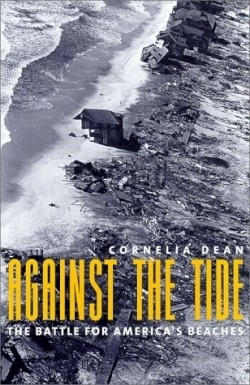Against the Tide
The Battle for America's Beaches
The degradation of North American sea beaches symbolizes the timeless struggle of civilization to tame wilderness, a struggle which, according to New York Times science editor Cornelia Dean, can be described as dubious at its best and deadly at its worst.
In the former instance, stabilization of shorelines to protect expensive properties may result in short-term gains, but the consequent disruption of coastal sand transport processes usually leads to net long-term losses of beaches; both the value of seafront properties and the integrity of the coastal environment are undermined. At worst, the insistence of civilization to settle unstable, environmentally volatile areas such as seashores can have grave results, such as the loss of over 5,000 human lives in the great hurricane of 1900 in Galveston, Texas.
Against the Tide is a well-researched chronicle of America’s costly and often controversial efforts to tame the shifting sands of its coasts. The author provides a comprehensive and well-referenced historical, political and geological context within which her depiction of human folly in the face of overwhelming natural forces unfolds. The author’s source materials—refereed scientific publications, government documents, newspaper articles and personal interviews—provide adequate support to her perspectives, and her journalistic style ultimately strengthens the integrity of her arguments.
Students of environmental law or perhaps coastal geology should find this book a sound, interdisciplinary introduction to the myriad issues surrounding coastal settlement and its economic, environmental and sometimes human consequences (June).
Reviewed by
David Speas
Disclosure: This article is not an endorsement, but a review. The publisher of this book provided free copies of the book to have their book reviewed by a professional reviewer. No fee was paid by the publisher for this review. Foreword Reviews only recommends books that we love. Foreword Magazine, Inc. is disclosing this in accordance with the Federal Trade Commission’s 16 CFR, Part 255.

